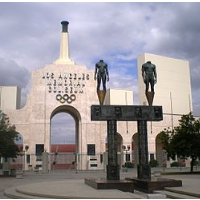Coliseum Commission Secrecy Broke the Law, but Judge Won’t Overturn Secret Decision
 Los Angeles Memorial Coliseum
Los Angeles Memorial Coliseum
The Los Angeles Memorial Coliseum Commission violated California’s open-meeting law nine times when it met in secret sessions to hammer out a strategy for turning over control of the venerated stadium to the University of Southern California (USC), a judge said last week.
But Los Angeles Superior Court Judge Luis A. Lavin indicated he was loath to tear up the contract, opting instead to badmouth the commissioners, order the release of documents they were sitting on, require them to record their closed-door sessions for three years and issue an injunction barring them from doing what they’d already done.
The Los Angeles Times and Californians Aware, a First Amendment group, filed a lawsuit to abrogate the deal reached in May 2012, which includes a 98-year lease giving USC control of the money-losing stadium and the nearby Sports Arena. The agreement provides very little revenue, in return, for the public should the university succeed in straightening out the Coliseum’s finances and improving its business model. The school has pledged $70 million to renovate the stadium and would make $1 million-a-year rent payments to the state.
The Times has written more than 100 stories about the commission over the past two-plus years, covering ethics probes, financial scandals, dubious behavior by officials, a lack of transparency and a fugitive suspect fleeing to Brazil. Under fire, the commission voted to turn over control of the stadium to USC and made a deal that critics say is highly favorable to the school.
The judge made it clear that he thought the secret meetings were instrumental in the commission reaching a decision, a violation of the Ralph M. Brown Act. “Certainly the public has a legitimate and substantial interest in scrutinizing the process leading to the commission's deal with USC for the use and management of the iconic Los (Angeles) Memorial Coliseum and the Los Angeles Sports Arena to ensure that the decision was not based on political favoritism or some other criteria that do not serve the public,” Lavin reportedly wrote.
The judge singled out the commission’s top administrator, John Sandbrook, for particular criticism. Lavin said Sandbrook lied in testimony to the court about the secrecy and predicted that the commission would continue to act illegally if the court did not step in. Commission member and former L.A. Councilman Bernard C. Parks, the lone vote against the USC deal, said the district attorney should consider perjury charges.
Lavin gave the panel 10 days to produce documents the Times has sought for months. They included a financial report that the judge said was labeled a draft and withheld from public scrutiny because of its “embarrassing” nature.
Already released were 94 damning internal e-mails that included derogatory comments by former commission President David Israel, a Governor Arnold Schwarzenegger appointee who is now chairman of the California Horse Racing Board, about Parks, whom he called “Col. Klink,” after the hapless Nazi in the television show “Hogan’s Heroes.”
–Ken Broder
To Learn More:
Judge Says L.A. Memorial Coliseum Commission Violated California's Open Meeting Law (by Wendy Lee, KPCC)
Judge Orders L.A. Coliseum Documents Released in Secrecy Lawsuit (by Paul Pringle and Rong-Gong Lin II, Los Angeles Times)
Judge Says Coliseum Panel Apparently Violated Open-Meeting Law (by Paul Pringle and Rong-Gong Lin II, Los Angeles Times)
Head of Coliseum Commission Testified Falsely, Judge Rules (by Paul Pringle and Rong-Gong Lin II)
Leaked L.A. Coliseum Commission Emails Add Fuel to Fight with the Times (by Ken Broder, AllGov California)
- Top Stories
- Controversies
- Where is the Money Going?
- California and the Nation
- Appointments and Resignations
- Unusual News
- Latest News
- California Forbids U.S. Immigration Agents from Pretending to be Police
- California Lawmakers Urged to Strip “Self-Dealing” Tax Board of Its Duties
- Big Oil’s Grip on California
- Santa Cruz Police See Homeland Security Betrayal in Use of Gang Roundup as Cover for Immigration Raid
- Oil Companies Face Deadline to Stop Polluting California Groundwater





